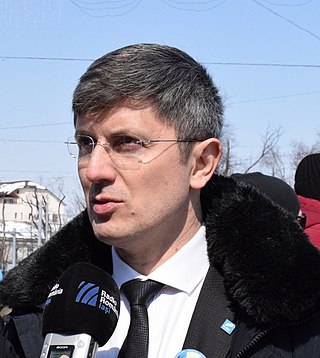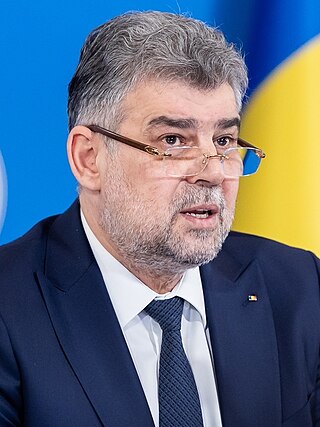
Romania's political framework is a semi-presidential representative democratic republic where the Prime Minister is the head of government while the President, according to the constitution, has a more symbolic role, is responsible for the foreign policy, signs certain decrees, approves laws promulgated by the parliament, and nominates the head of government. Romania has a democratic, multi-party system, with legislative power vested in the government and the two chambers of the Parliament, more specifically the Chamber of Deputies and the Senate. The judiciary is independent of the executive and the legislature. From 1948 until 1989, the communist rule political structure took place in the framework of a one-party socialist republic governed by the Romanian Communist Party (PCR) as its only legal party.

The Social Democratic Party is the largest political party in Romania, though in the European Parliament, it is the second largest by total number of political representatives, after the National Liberal Party (PNL). It is also the largest social democratic political party in the country. It was founded by Ion Iliescu, Romania's first democratically elected president at the 1990 Romanian general election. It is currently part of the National Coalition for Romania (CNR), which is a big tent grand coalition comprising also the National Liberal Party (PNL). The CNR formerly included the Democratic Alliance of Hungarians in Romania (UDMR/RMDSZ) until mid June 2023.

The National Liberal Party is a Christian-democratic and socially conservative political party in Romania. Re-founded in mid January 1990, shortly after the Revolution of 1989 which culminated in the fall of communism in Romania, it claims the legacy of the major political party of the same name, active between 1875 and 1947 in the Kingdom of Romania. Based on this historical legacy, it often presents itself as the first formally constituted political party in the country and the oldest of its kind from the family of European liberal parties as well.

Cătălin Marian Predoiu is a Romanian lawyer who served as the ad interim Prime Minister of Romania from 12 June to 15 June 2023, following the resignation of Nicolae Ciucă, having previously served from 6 February to 9 February 2012, following the resignation of Emil Boc. He had previously been the Minister of Justice of Romania since 29 February 2008.

Ludovic Orban is a Romanian engineer and politician who was the prime minister of Romania from November 2019 to December 2020. He was president of the National Liberal Party (PNL) between 2017 and 2021, which expelled him shortly after he lost a bid for another term as its leader. He was also minister of transport from April 2007 to December 2008 in the second Tăriceanu cabinet.

Raluca Turcan is a Romanian politician. A member of the National Liberal Party (PNL), she has been a member of the Romanian Chamber of Deputies for Sibiu County since 2004.

Vasilica Viorica Dăncilă is a Romanian politician, former leader of the Social Democratic Party (PSD), and was Prime Minister of Romania from 29 January 2018 to 4 November 2019. She is the first woman in Romanian history to hold both the office of Prime Minister and that of president of the PSD. In 2014, she was elected to a second term as a Member of the European Parliament (MEP), representing the PSD. She was also president of the Social Democratic Women's Organization (OFSD) between 2015 and 2018.
The Fourth Ponta Cabinet was the government of Romania from 17 December 2014 to 17 November 2015. The Cabinet was supported by the Social Democratic Party (PSD), the National Union for the Progress of Romania (UNPR) and the Alliance of Liberals and Democrats (ALDE), the alliance forged by Călin Popescu-Tăriceanu's Liberal Reformist Party (PLR) and Daniel Constantin's Conservative Party (PC). Fourteen of the ministerial portfolios were held by PSD members, three by ALDE, two by UNPR and two by independent members.

Parliamentary elections were held in Romania on 6 December 2020 to elect the 136 members of the Senate and the 330 constituent members of the Chamber of Deputies.

Presidential elections were held in Romania on 10 November 2019, with a second round held on 24 November 2019. They were the eighth presidential elections held in post-1989 Romania. Incumbent President of Romania Klaus Iohannis, first elected in 2014, was eligible for re-election. He subsequently defeated former Prime Minister and ex-leader of the Social Democratic Party (PSD) Viorica Dăncilă in the second round of the election by a landslide, receiving 66% of the vote – the second-highest vote share on record in this type of elections after Ion Iliescu.

The 2024 European Parliament election in Romanian was held on 9 June 2024. This was the fifth European Parliament election to be held in Romania since the country's accession to the European Union in 2007 and the first since Brexit.

Ion-Marcel Ciolacu is a Romanian politician who currently serves as the Prime Minister of Romania. He is also the leader of the Social Democratic Party (PSD). As a previously little-known politician outside of Buzău County, where he owns a pastry shop and a consulting firm, Ciolacu came into national prominence when he became the deputy prime minister in 2018 in the cabinet of Prime Minister Mihai Tudose. Allegedly, he was given this office in order to report Tudose's activities to Liviu Dragnea, who had been unable to become prime minister himself and was wary of Tudose becoming a power player in the party. Ciolacu soon broke with Dragnea and became an ally of Tudose against Dragnea's leadership. After Tudose's resignation, Ciolacu was marginalized within PSD but still retained the leadership of PSD Buzău. Ciolacu once again returned to prominence in 2019 after Liviu Dragnea had been convicted on abuse of office and incitement to intellectual forgery charges, having to serve a 3 years, 6 months sentence. With the Social Democrats still controlling a majority both in the Chamber and in the Senate, Ciolacu won the position of President of the Chamber of Deputies, with 172 votes for and 120 against, previously held by Dragnea himself.
Events from the year 2021 in Romania.

Parliamentary elections are scheduled to be held in Romania on 1 December 2024.

Presidential elections will be held in Romania on 24 November 2024. A second round will be held on 8 December 2024 if no candidate receives an absolute majority of the vote. They will be the ninth presidential elections held in post-1989 Romania. As the Romanian Constitution allows a maximum of two presidential terms, incumbent President of Romania Klaus Iohannis, first elected in 2014 and then re-elected in 2019, is not eligible for re-election. His second term will formally end in December 2024.
A political crisis began on 1 September 2021 in Romania, engulfing both major coalition partners of the Cîțu Cabinet, namely the conservative-liberal National Liberal Party (PNL) and the progressive-liberal Save Romania Union (USR). The crisis also involved former prime minister Ludovic Orban (PNL), who was set to face Prime Minister Florin Cîțu (PNL) in a leadership election during the party congress on 25 September, with the latter eventually replacing the former. Orban would eventually resign from his position as President of the Chamber of Deputies, with him and his supporters subsequently splitting from the PNL, in order to form the Force of the Right (FD).

Force of the Right, sometimes translated as Right's Force or Right Force, is a liberal-conservative political party in Romania founded in December 2021 by Ludovic Orban, former National Liberal Party (PNL) president and former Prime Minister of Romania between 2019 and 2020, in opposition to the current leadership of the PNL which is currently officially led by Nicolae Ciucă and unofficially by Klaus Iohannis.

The National Coalition for Romania, initially referred to as the Coalition for Resilience, Development and Prosperity, is a big tent grand coalition in Romania, which includes the Social Democratic Party (PSD) and the National Liberal Party (PNL). In addition, this grand coalition supports the presidency of Klaus Iohannis. The CNR also included the Democratic Alliance of Hungarians in Romania (UDMR/RMDSZ) until its withdrawal from the coalition in June 2023.

The 2020–2024 legislature of the Romanian Parliament is the current legislature of the Parliament of Romania, elected on 6 December 2020. In the said election, no party won an outright majority, but the Social Democratic Party (PSD) remained the largest political force in the parliament, in opposition however. The National Liberal Party (PNL), the Save Romania Union (USR), and the Democratic Alliance of Hungarians in Romania (UDMR/RMDSZ) formed a coalition government. The USR ran within a political alliance it established with a smaller party, more specifically the Freedom, Unity and Solidarity Party (PLUS), which was eventually absorbed by the former. The Alliance for the Union of Romanians (AUR) entered parliament starting this legislature with an unexpected high score, gaining more popularity ever since.
Events from the year 2022 in Romania.















